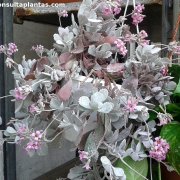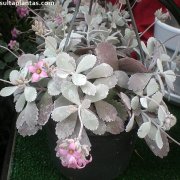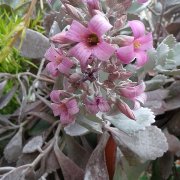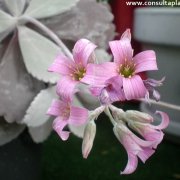Care of the succulent plant Kalanchoe pumila or Flower dust plant |
|
The genus Kalanchoe, family Crassulaceae, comprises 100 species of succulent plants native to Asia, Africa and Europe. Some species are: Kalanchoe pumila, Kalanchoe marmorata, Kalanchoe longiflora, Kalanchoe daigremontiana, Kalanchoe beharensis, Kalanchoe thyrsiflora, Kalanchoe tomentosa, Kalanchoe gastonis-bonnieri, Kalanchoe blossfeldiana, Kalanchoe uniflora, Kalanchoe manginii, Kalanchoe pinnata, Kalanchoe fedtschenkoi. Common names: Flower dust plant, Ghost plant. This species is native to Madagascar. They are succulent plants of easy cultivation and hanging or creeping bearing that reach 30 cm (11.8") in height. The fleshy leaves are grayish-green with reddish tones and have wavy edges. The showy flowers appear in umbels and can be pink or lilac. They can bloom from late winter to fall; to do so they need several hours of direct sunlight a day. Flower dust plant is used in hanging pots on terraces, patios or well-lit and ventilated interiors. In winter regions without frost it's used in rockeries and low walls. Kalanchoe pumila can grow in full sun or semi-shade exposure; it needs very hot summer climates like the Mediterranean climate. In winter it is advisable that it rests at 13-15 ºC (55-59 ºF). Ghost plant can grow in poor soils but prefer that they contain organic matter; it's very important that the drainage is excellent. The transplant is done in spring if the pot is too small. Water regularly (do not wet the leaves) in spring and summer waiting for the substrate to dry. In autumn watering is reduced and in winter water once a month. Fertilize every 20 days with mineral fertilizer for cacti in spring and summer. Prune lightly after flowering to maintain a compact appearance. Eliminate withered flowers. The worst enemy of Kalanchoe pumila is excess moisture that can rot the roots and stems. Flower dust plant propagates from cuttings (at the time of pruning) placed to root in a sandy substrate. |
Images of the succulent plant Kalanchoe pumila or Flower dust plant |
Find plants
Kalanchoe pumila or Flower dust plant | Care and Growing
© 2026 FavThemes



